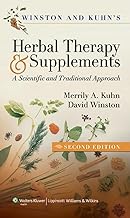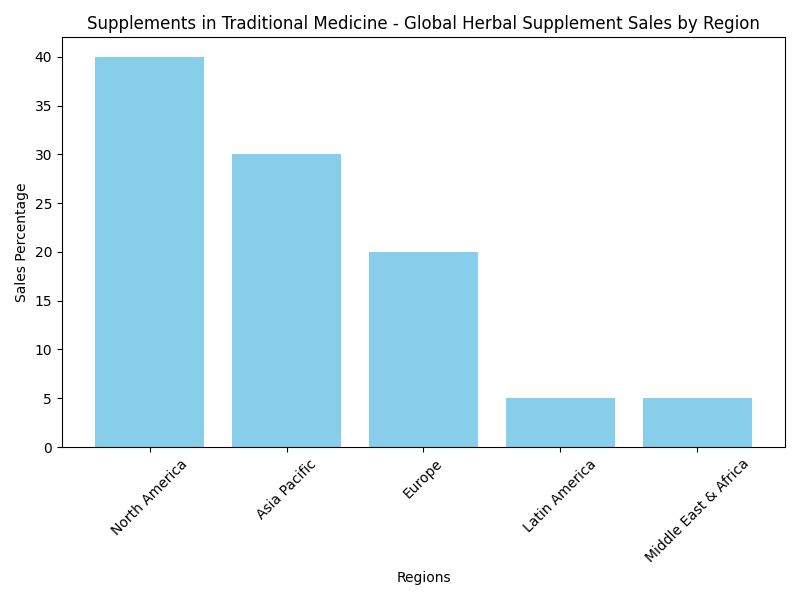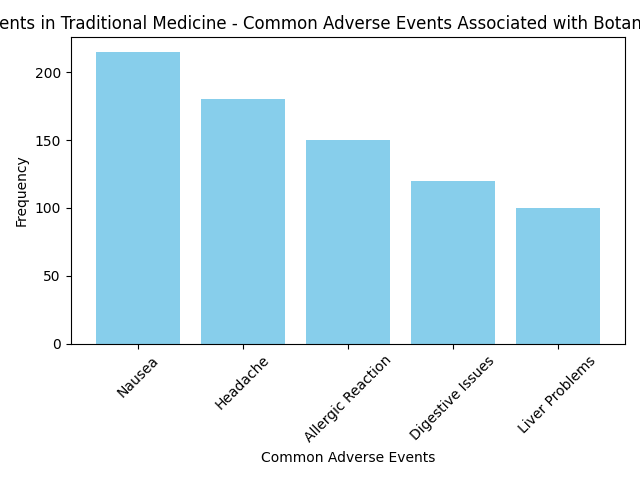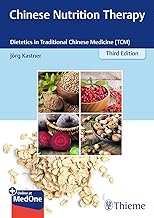Supplements in Traditional Medicine: A Wholesome Approach to Health
Key Takeaways
| Topic | Summary |
|---|---|
| Global Reach | Herbal supplements have a significant market worldwide, with specific regions displaying higher sales and preferences. |
| Safety Profiles | Understanding the risks and safety profiles of herbal medicine is crucial for informed usage. |
| Traditional Chinese Medicine (TCM) | TCM offers dietary supplements that integrate into a holistic health approach, balancing body and mind. |
| Interaction with Prescription Medicines | Herbal supplements can interact with prescription medications, necessitating careful management. |
| Digestive and Cognitive Health | Certain herbs are evaluated for their efficacy in supporting digestive health and cognitive function. |
| Weight Management Advances | Herbal health products are continually evolving, offering new options for weight management. |
| Joint Health and Flexibility | Supplements specifically aimed at joint health and flexibility are gaining popularity. |
| Dietary Supplements vs. Herbal Medicines | Understanding the distinction between these two types of health aids is key to choosing the right option. |
Ever found yourself wandering the endless aisles of health stores, bewildered by an array of herbal potions and pills claiming to be the key to eternal wellness? You’re not alone. In a world where modern medicine meets ancient wisdom, the line between effective treatment and fanciful remedies can often blur. Let’s embark on a journey through the realm of supplements in traditional medicine, where we’ll debunk myths, highlight facts, and perhaps, discover a few secrets to better health along the way. Ready to dive in?
Exploring the Top Herbal Supplements in Traditional Medicine

Winston & Kuhn’s Herbal Therapy and Supplements: A Scientific and Traditional Approach
Herbal supplements are not just a trend; they are a testament to the timeless pursuit of wellness through nature. The compendium by Winston & Kuhn takes a discerning look into the heart of herbal therapy, bridging the gap between anecdotal wisdom and scientific scrutiny. Have you ever considered turning to Echinacea for that nagging cold or perhaps Ginseng for an energy boost? The efficacy of such herbal supplements, backed by scientific research, might just sway skeptics towards giving them a try. But, as with any remedy, the key lies in knowledge and moderation. Have you checked out what Winston & Kuhn have to say about your favorite herb?
The Global Reach of Herbal Supplements and Their Health Benefits

The world, it seems, has embraced herbal supplements with open arms. The fascination isn’t uniform, though. Certain regions lean heavily towards specific herbs due to cultural beliefs, availability, or prevalent health issues. For instance, did you know North America and Asia Pacific are leading the charge in global herbal supplement sales? This love affair with herbal remedies spans the globe, from the turmeric-laden diets of South Asia to the ginseng enthusiasts in East Asia. Does your region have a favorite herbal hero?
Safety Profiles: Understanding the Risks Associated with Herbal Medicine

As the saying goes, “With great power comes great responsibility.” The world of herbal supplements is no exception. The allure of natural treatment options is undeniable, but are we fully aware of the potential risks and side effects? From mild digestive upsets to more severe allergic reactions, the safety profile of herbal supplements is a topic worthy of our attention. How can we ensure the benefits outweigh the risks? Perhaps a closer look at the common adverse events associated with botanical ingredients can provide some clarity.
Demystifying Traditional Chinese Medicine (TCM) and Its Dietary Supplements

Chinese Nutrition Therapy: Dietetics in Traditional Chinese Medicine (TCM)
The wisdom of Traditional Chinese Medicine (TCM) transcends centuries, offering a holistic approach to health that balances the mind, body, and spirit. TCM’s dietary supplements, including herbs and formulations like Qi-tonifying Astragalus or calming Jujube, embody this balance. But how do these ancient practices fit into our modern lives? Can the principles of Qi, Yin, and Yang really influence our well-being? Diving into the intricate world of TCM dietary supplements might just reveal some answers and possibly, a new perspective on health.
The Interplay Between Herbal Supplements and Prescription Medicines
Navigating the waters of health and wellness requires a keen understanding of how different substances interact within our bodies. This is especially true when it comes to mixing herbal supplements with prescription medications. The synergies and conflicts between these can be complex and sometimes unexpected. For instance, did you know that St. John’s Wort can diminish the efficacy of certain prescription drugs? It’s a reminder that, before embarking on any herbal regimen, consulting a healthcare professional isn’t just wise—it’s essential.
Herbal Remedies for Digestive Health: Evaluating Efficacy and Safety
When it comes to our digestive health, the allure of gentle, natural remedies is undeniable. But efficacy and safety are paramount. Herbs like peppermint and ginger have been lauded for their soothing properties, but how do we evaluate their true effectiveness? Is there scientific evidence to back up the claims? Understanding the balance between tradition and research could unlock the door to improved digestive wellness, potentially offering relief to those of us navigating the challenges of IBS or indigestion. But always remember, the consultation with a healthcare provider is key.
The Role of Medicinal Herbs in Cognitive Function and Cardiovascular Health
The quest for improved cognitive function and cardiovascular health has led many to the doorstep of herbal supplements. Ginkgo Biloba and Hawthorn berries, for instance, have entered the spotlight for their purported benefits. But the question remains: How efficacious are these herbs? With advancements in research, we’re beginning to see a clearer picture of how these ancient remedies might support our modern-day health pursuits. Yet, one cannot help but wonder, are we witnessing the resurgence of age-old wisdom, or is this the placebo effect in action?
Advances in Herbal Health Products and Supplements for Weight Management
In the ever-evolving landscape of weight management, herbal supplements like green tea extract and Garcinia Cambogia have carved out a niche for themselves. But with the sheer range of products on the market, sifting through the noise to find truly effective supplements can feel like a Herculean task. The latest trends and insights for 2024 suggest a shift towards more holistic and sustainable weight loss methods, emphasizing not just the physical, but also the psychological components of dietary habits. Could this be the future of weight management?
Exploring the Use of Herbal Supplements for Joint Health and Flexibility
The pursuit of joint health and flexibility, especially as we age, is more than just a desire—it’s a necessity for maintaining quality of life. Curcumin and Boswellia have emerged as popular choices for those seeking relief from joint discomfort, backed by promising research. But as we explore these natural aids, it’s vital to balance hope with skepticism. How do these supplements stack up against traditional treatments? The journey towards pain-free movement may well benefit from nature’s pharmacy, provided we tread cautiously.
Dietary Supplements vs. Herbal Medicines: Defining the Differences and Similarities
In a world brimming with health aids, understanding the nuances between dietary supplements and herbal medicines is more important than ever. While they may seem interchangeable to the untrained eye, the distinctions in terms of regulation, usage, and purpose are significant. Navigating this complex landscape requires a discerning approach, one that recognizes the strengths and limitations of each. Knowledge, as they say, is power. Armed with the right information, we’re better positioned to make choices that enhance our health without compromising safety.
Related Articles
- Natural and Herbal Supplements: A Guided Tour Through Nature’s Pharmacy
- Types of Supplements: Unveiling the Latest Trends and Insights for 2024
- Thyroid Health and Weight Loss: Enhancing Metabolic Balance with Thyroid Supplements
- 7 Stress Supplements: Herbs to Reduce Stress and Find Inner Peace
- Herbal Medicine
- Clinical Implications of Herbal Supplements in…
- What’s the difference between a food supplement and a herbal medicine?
In this journey through the realm of supplements in traditional medicine, we’ve uncovered not just the potentials but also the pitfalls of embracing nature’s bounty. The harmonious integration of herbal supplements into our lives hinges on our ability to marry ancient wisdom with contemporary scientific insight. After all, the true essence of well-being lies not in the remedy itself, but in our informed and mindful approach to embracing it. Shall we continue the exploration together, with both curiosity and caution as our guides?
Frequently Asked Questions
Q: What are herbal supplements and how are they used in traditional medicine?
A: Herbal supplements are products made from plants or plant extracts that are used to support health and well-being. In traditional medicine, herbal supplements are commonly used to treat various health conditions and maintain overall health.
Q: Are herbal supplements regulated by any health authorities?
A: In the United States, herbal supplements are regulated by the Office of Dietary Supplements, which is part of the National Institutes of Health. Regulations ensure the safety and effectiveness of herbal products.
Q: What are some common herbal supplements used in traditional medicine?
A: Some common herbal supplements include saw palmetto, black cohosh, and a variety of other herbs and botanicals that have been used for medicinal purposes for centuries.
Q: Are there any known drug interactions with herbal supplements?
A: Herbal supplements may interact with certain medications. It is important to consult with a health professional or doctor before taking any herbal supplements, especially if you are already taking medications.
Q: Should I participate in a clinical trial before using herbal medicines?
A: Clinical trials may help determine the safety and effectiveness of herbal preparations. It is advisable to talk to your doctor about participating in a clinical trial before using any herbal supplements.
Q: What is the best way to maintain health while taking herbal supplements?
A: To maintain health while taking herbal supplements, it is important to follow the recommended dosages, be aware of any potential side effects, and consult with a healthcare professional if you have any concerns.
Q: How can I ensure the safety and effectiveness of herbal supplements I use?
A: To ensure the safety and effectiveness of herbal supplements, it is recommended to purchase products from reputable sources, follow the instructions on the labels, and be informed about any potential interactions with other medications.
